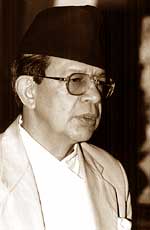 Excerpts from an interview with Pashupati SJB Rana of the Rastriya Prajatantra Party
Excerpts from an interview with Pashupati SJB Rana of the Rastriya Prajatantra Party Is the nation in a state of civil war?
I was out of the country when all of a sudden I learnt that the Maoists had broken off the talks. Their attacks in Dang and Syangja were very tragic. The government has every right granted to it by the constitution to take all necessary measures to control this insurgency. Everything the government is doing right now falls within the parameters of the constitution. We can only pass judgement on how these measures are implemented, because the government has imposed an emergency and issued an ordinance concerning the situation. Three things have happened at the same time. [The imposition of the emergency, designating the Maoists as terrorists and the promulgation of the anti-terrorism ordinance.] We cannot guess how the situation will play itself out. It has only been a week, so we will have to wait and see how effective these actions will be and analyse the results. It is not such a simple thing to do, suspending human rights. After the army was attacked, the government had to take some action and it did what it had to do.
Are you saying that whatever action the government has taken after the Maoists broke off the dialogue is correct?
Our central committee will pass its judgement only after analysing the results.
Are you implying that there may be misuse of the Terrorist and Disruptive Activities (Prevention and Control) Ordinance, 2001?
If you analyse the history of the Nepali Congress, you will find that whenever it has been given such powers, it has exploited them to benefit the party. The truth is that at present the country is facing a major problem, and that is all due to corruption and nepotism. In such a situation the Nepali Congress must be very patient, it must be able to restrain itself and it must utilise the powers given to it by the constitution in a proper manner. The Nepali Congress has never faced a problem of such magnitude earlier. So, in order to be able to tackle the situation, it must work very differently, it cannot go back to its normal behaviour. We have to wait and see if it functions appropriately.
People are saying that democratic rights will never return.
I do not feel it necessary to view the current context that way. It all depends on how the government functions. We are now faced with a certain situation. A new agency is being deployed. What is to be done when an agency is mobilised? What must be done in general? This problem will not be solved only through war. The government had earlier also made provisions concerning the development and security of the country. How should these development programs be carried forward? What must be done under the security programmes? It is the time right now to make some changes. The government must be able to win the minds of the people, and for that, it will need to initiate some programmes. Some fundamental changes have to be brought about and improvements will have to be made as and when required. There must be special programmes for people who fall below the poverty line. Corruption has become a major problem and has to be controlled. If corruption increases during this emergency, we will soon be facing an even bigger problem.
Earlier, when Girija Prasad Koirala was prime minister and wanted to deploy the army, everyone protested. Now when the army has been deployed, everyone says the king and the prime minister see eye to eye.
I do not think like that. I was not here at either time, so I cannot answer this question.
Will the Maoist problem be solved just with the use of force?
How can it be solved by force alone? Whatever the Maoists do, I cannot say that theirs is simply a political agenda. All that has been happening until now-corruption, indiscipline, earlier missteps-all these have ignited the protest. We have to understand the reasons behind the revolt. As I said earlier, we have to bring about changes in our political, economic and social sectors. We have to prove that we can have a government that is disciplined, patient, and that works for the benefit of the people. I feel the government now is following a one-track agenda. Security is only one aspect of it. Development and poverty alleviation must go together with security. When we had a dialogue, everything was concentrated on security; now that we have declared war, everything is still concentrated on security. If we are to move forward, eventually we will have to negotiate. This problem will not be resolved only through the use of force.
People say that there is a special relationship between you and Prime Minister Sher Bahadur Deuba. Haven't you given him any advice?
Definitely, we have a great relationship. We worked together for 19 months. That time also we worked on big projects, like the Mahakali project, etc. If he asks me anything, certainly, we can share ideas.


